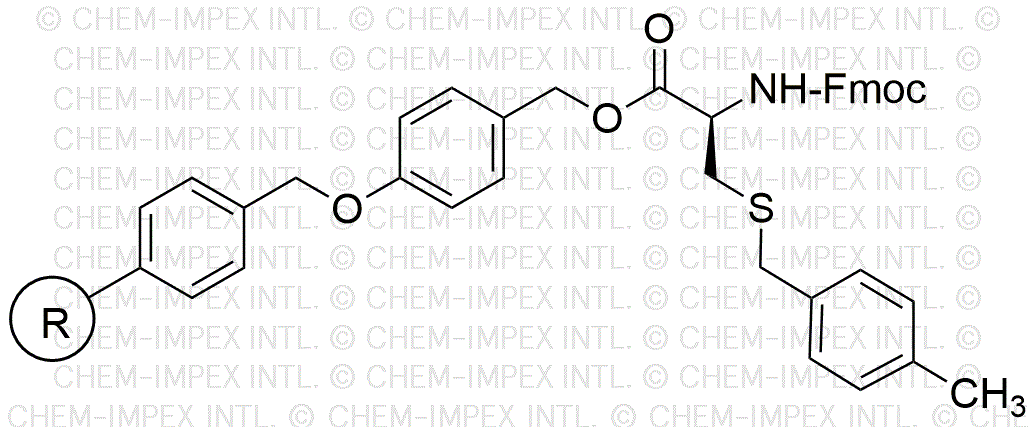Fmoc-S-4-methylbenzyl-L-cysteine 4-alkoxybenzyl alcohol resin is widely utilized in research focused on:
- Peptide Synthesis: This resin is essential for solid-phase peptide synthesis, allowing researchers to efficiently create custom peptides for various applications in drug development and biotechnology.
- Bioconjugation: It serves as a versatile linker in bioconjugation processes, enabling the attachment of biomolecules to surfaces or other molecules, which is crucial in developing targeted therapies and diagnostics.
- Drug Delivery Systems: The resin can be used to formulate drug delivery systems that enhance the stability and bioavailability of therapeutic agents, making treatments more effective.
- Research in Cancer Therapeutics: Its unique properties allow for the design of novel compounds that can selectively target cancer cells, providing a pathway for more effective cancer treatments.
- Material Science: The resin is also explored in material science for creating functional materials with specific chemical properties, which can be applied in sensors and electronic devices.
Informations générales
Propriétés
Sécurité et réglementation
Applications
Fmoc-S-4-methylbenzyl-L-cysteine 4-alkoxybenzyl alcohol resin is widely utilized in research focused on:
- Peptide Synthesis: This resin is essential for solid-phase peptide synthesis, allowing researchers to efficiently create custom peptides for various applications in drug development and biotechnology.
- Bioconjugation: It serves as a versatile linker in bioconjugation processes, enabling the attachment of biomolecules to surfaces or other molecules, which is crucial in developing targeted therapies and diagnostics.
- Drug Delivery Systems: The resin can be used to formulate drug delivery systems that enhance the stability and bioavailability of therapeutic agents, making treatments more effective.
- Research in Cancer Therapeutics: Its unique properties allow for the design of novel compounds that can selectively target cancer cells, providing a pathway for more effective cancer treatments.
- Material Science: The resin is also explored in material science for creating functional materials with specific chemical properties, which can be applied in sensors and electronic devices.
Documents
Fiches de données de sécurité (FDS)
La FDS fournit des informations de sécurité complètes sur la manipulation, le stockage et l’élimination du produit.
Spécifications du produit (PS)
Le PS fournit une description complète des propriétés du produit, notamment sa composition chimique, son état physique, sa pureté et les exigences de stockage. Il détaille également les plages de qualité acceptables et les applications prévues du produit.
Certificats d'analyse (COA)
Recherchez des certificats d'analyse (COA) en saisissant le numéro de lot du produit. Les numéros de lot et de lot se trouvent sur l'étiquette d'un produit, après les mots « Lot » ou « Lot de fabrication ».
Numéro de catalogue
Numéro de lot/série
Certificats d'origine (COO)
Ce certificat d'exploitation confirme le pays dans lequel le produit a été fabriqué, et détaille également les matériaux et composants utilisés et s'il est issu de sources naturelles, synthétiques ou autres sources spécifiques. Ce certificat peut être requis pour les douanes, le commerce et la conformité réglementaire.
Numéro de catalogue
Numéro de lot/série
Fiches de données de sécurité (FDS)
La FDS fournit des informations de sécurité complètes sur la manipulation, le stockage et l’élimination du produit.
DownloadSpécifications du produit (PS)
Le PS fournit une description complète des propriétés du produit, notamment sa composition chimique, son état physique, sa pureté et les exigences de stockage. Il détaille également les plages de qualité acceptables et les applications prévues du produit.
DownloadCertificats d'analyse (COA)
Recherchez des certificats d'analyse (COA) en saisissant le numéro de lot du produit. Les numéros de lot et de lot se trouvent sur l'étiquette d'un produit, après les mots « Lot » ou « Lot de fabrication ».
Numéro de catalogue
Numéro de lot/série
Certificats d'origine (COO)
Ce certificat d'exploitation confirme le pays dans lequel le produit a été fabriqué, et détaille également les matériaux et composants utilisés et s'il est issu de sources naturelles, synthétiques ou autres sources spécifiques. Ce certificat peut être requis pour les douanes, le commerce et la conformité réglementaire.

